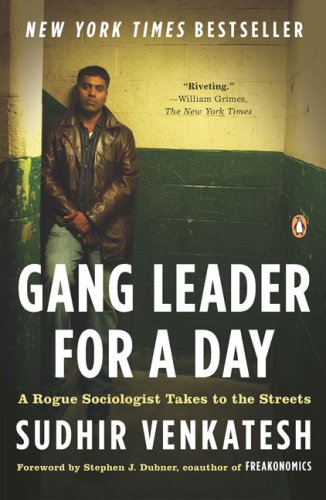Summary
As a young graduate student fresh off an extended stint following the Grateful Dead, Venkatesh began studying urban poverty. With a combination of an ethnographer's curiosity about another culture and some massive naïveté, he gathered firsthand knowledge of the intricacies of Chicago's Robert Taylor projects. Early on, he met a megalomaniac gang leader known here as J.T., who became his mentor. Venkatesh observed and learned how the crack game works, and how many have their fingers in the pie and need life to remain the way it is. He observed violence, corruption, near homelessness, good cops, bad cops, and a lot of neglect and politics-as-usual. He made errors in judgment—it took a long time for his street smarts to catch up to his book smarts—but he tells the story in such a way as to allow readers to figure out his missteps as he did. Finally, as the projects began to come down, Venkatesh was able to demonstrate how something that seems positive is not actually good for everyone. The first line in his preface, "I woke up at about 7:30 a.m. in a crack den," reflects the prurient side of his studies, the first chapter title, "How does it feel to be black and poor?" reflects the theoretical side, and both work together in this well-rounded portrayal. (School Library Journal)
About the Author
Sudhir Venkatesh is William B. Ransford Professor of Sociology, and the Committee on Global Thought, at Columbia University in the City of New York.
His most recent book is Gang Leader for a Day (Penguin Press). Gang Leader received a Best Book award from The Economist, and is currently being translated into Chinese, Korean, Japanese, German, Italian, Polish, French and Portuguese. His previous work, Off the Books: The Underground Economy of the Urban Poor (Harvard University Press, 2006) about illegal economies in Chicago, received a Best Book Award from Slate.com (2006) as well as the C. Wright Mills Award (2007). His first book, American Project: The Rise and Fall of a Modern Ghetto (2000) explored life in Chicago public housing.
Venkatesh’ editorial writings have appeared in The New York Times, the Chicago Tribune, and the Washington Post. He writes for Slate.com, and his stories have appeared in This American Life, WIRED, and on National Public Radio. His next book, under contract with Penguin Press, will focus on the role of black market economies—from sex work and drug trafficking to day care and entertainment—in the revitalization of New York since 1999.
Venkatesh is completing an ethnographic study of policing in the Department of Justice, where he served as a Senior Research Advisor from 2010-2011.
Venkatesh’s first documentary film, Dislocation, followed families as they relocated from condemned public housing developments. The documentary aired on PBS in 2005. He directed and produced a three-part award winning documentary on the history of public housing for public radio. And, he recently completed At the Top of My Voice, a documentary film on a scholar and artist who return to the ex-Soviet republic of Georgia to promote democracy and safeguard human rights.
Venkatesh received his Ph.D. in Sociology from the University of Chicago. He was a Junior Fellow at the Society of Fellows, Harvard University from 1996-1999, and an NSF CAREER award recipient in 2000. He holds a visiting appointment in Columbia University’s Law School and he is a voting member of the Institute for Research in African-American Studies.
